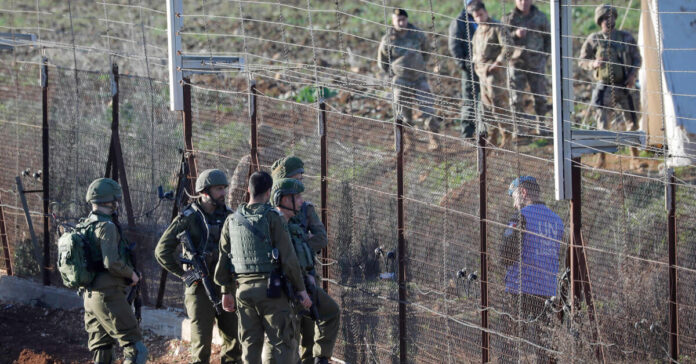In the heart of the Middle East, amid the tinderbox of the Israeli-Lebanese border, two men defy danger as they scramble down a concrete wall, clutching an Israeli military camera they’ve torn off as a trophy. What follows is a tense and life-threatening game of dare, raising fears of a violent and bloody escalation in one of the world’s most volatile regions.
Recent months have witnessed a surge in incidents at the United Nations-patrolled boundary, known as the Blue Line, separating Israel and the occupied Golan Heights from Lebanon. Both Israel and the Lebanese militant group Hezbollah have been accused by the UN peacekeeping force in Lebanon, Unifil, of multiple breaches of international commitments at the border and beyond.
Rocket fire into Israel by Palestinian militants in Lebanon, backed by Hezbollah, and retaliatory Israeli artillery fire have added to the growing tension. A cross-border raid earlier in the year, resulting in an Israeli shooting of a Lebanese militant, further fueled concerns about the prospects of a third devastating war between Israel and Lebanon.
One farmer, Levav Weinberg, living near the border, described the audacious actions taking place this summer, with Hezbollah tents reportedly raised near the boundary, as well as armed men shouting threats across the fence. As someone who experienced the devastation of the second Lebanon war in 2006, Weinberg fears a return to those dark times.

The situation is a precarious tightrope walk, with both sides engaging in brinkmanship and military drills near the border. Hezbollah, designated as a terrorist group by Israel and the West, has its power base in Lebanon and draws support from Iran. Amidst Lebanon’s political vacuum and mounting challenges, Hezbollah seeks to assert its relevance and strength, using the Blue Line as a platform for its messaging.
The standoff is not isolated but part of a broader regional conflict, with Israel routinely targeting Iranian proxy fighters in Syria and opposing any renewal of the nuclear deal with Iran. Israel perceives the agreement as empowering Iran and its proxies like Hezbollah, maintaining a sense of pressure to thwart the deal.
As tension heightens, new barriers are constructed on the Israeli side of the Blue Line, and both sides posture ahead of US-brokered talks to demarcate the border. With growing unity among Palestinian militant groups in Lebanon and Gaza, the al-Aqsa mosque in Jerusalem becomes another flashpoint for potential escalation.
Ultimately, the region remains on edge, and history warns that miscalculation can quickly lead to catastrophe. The Blue Line stands as a tripwire for war, a delicate thread holding back the specter of a third devastating conflict between Israel and Lebanon.


